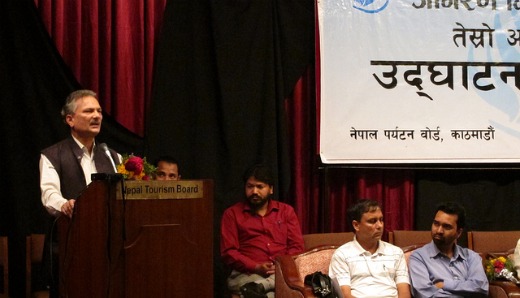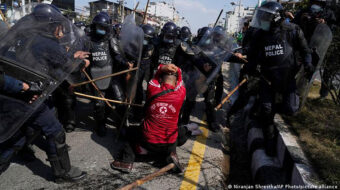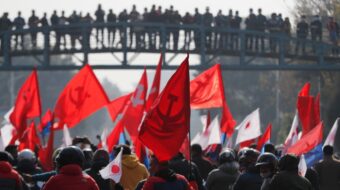
The Parliament of Nepal elected Baburam Bhattarai, vice chairperson of the Unified Communist Party of Nepal (Maoist), to the Prime Minister’s office, following the brief administration Jhalanath Khanal, who resigned after failing to advance deals on a peace process and new constitution.
On Sept. 4, Bhattarai expanded his cabinet by appointing six ministers from his own party and eleven from five allied parties, bringing fragile stability to a legislature previously deadlocked over the future of 20,000 Maoist combatants.
Bhattarai is a prominent left intellectual and former architect educated in India, and long viewed as his party’s best candidate for brokering a settlement where his predecessors had failed. The Maoists previously held the prime minister’s post in 2008, while Khanal and his immediate predecessor were members of the Communist Party of Nepal (Unified Marxist-Leninist). From 1990 to the republic’s formation in 2008, Nepal saw sixteen different prime ministers, mostly from the moderate social democratic Nepali Congress, and three cabinets headed by the right-wing royalist Rastriya Prajatantra Party.
The new prime minister came under attack from critics of his plan to grant amnesty to persons accused of human rights violations during the Maoist-named People’s War, which aimed to overthrow the ruling monarchy, also sometimes called the Nepal civil war.
The agreement also comes shortly after a peace deal, cautiously praised by the parties outside the coalition, will see former rebels disarm, retire and re-integrate.
A letter from Amnesty International, Human Rights Watch, Advocacy Forum, and the International Association of Jurists urged Bhattarai to drop the agreement, saying it “calls for the withdrawal of criminal cases during the country’s armed conflict” and would “deny victims of these crimes their fundamental rights.”
Crafted between the Maoists and parties representing Nepal’s southern Madheshi minority upon which it will depend for parliamentary support, it was opposed by legislators from many other parties.
In an office meeting with activists, Bhattarai responded by saying that the deal will “acquit only those implicated by the state on fake charges during [the war]”, reported India-based Zee News. He also said that cases would only be withdrawn after thorough investigations.
Long under absolute rule by the Shah dynasty, Nepal became a constitutional monarchy following the 1990 democracy movement that forced the monarchy to establish a parliament. In 1991, Nepal held elections that resulted in large seat numbers for Communist political parties.
Despite those victories, a second popular democracy movement began. In 1996, the Maoists launched an armed insurgency.
By 2005, the monarch had lost significant public support after reclaiming executive authority, towards the end of a conflict, where both the Royal Nepali Army and Maoists were criticized for human rights abuses. Government-sponsored and other vigilante groups where also actors in the violence.
“The CPNM has assassinated government supporters and police, and occasionally bombed Kathmandu. The government has ‘disappeared’ opponents, razed villages, and executed CPNM members and their supporters”, wrote Conn Hallinan of the Institute for Policy Studies in 2004.
Some reacted with skepticism of the new prime minister, asserting that UCPM (Maoist) has actually been acting in the interests of certain sections of the country’s business elite, and will be quickly moving towards attracting foreign direct investment from India.
As part of the peace deal, authority over the People’s Liberation Army, the armed wing of the Maoist party’s current incarnation, has now been transferred to an all-party committee, which also received keys to rebel arms containers across the country.
The Maoist party gained attention since the Obama administration recently announced its removal from the U.S. Foreign Terrorist Organization list. However it remains on the Specially Designated Global Terrorist list, and the immigration act’s Terrorism Exclusion List, which are lists with less stringent criteria. For example it does not makes it a crime to provide them with financial support.
The armed conflict between the Maoists and the government lasted from February 1996 to November 2006 and is estimated to have claimed nearly 13,000 lives.
Photo: Former Finance Minister, and now, Prime Minister Baburam Bhattarai speaks at June meeting. Advocacy Project // CC












Comments